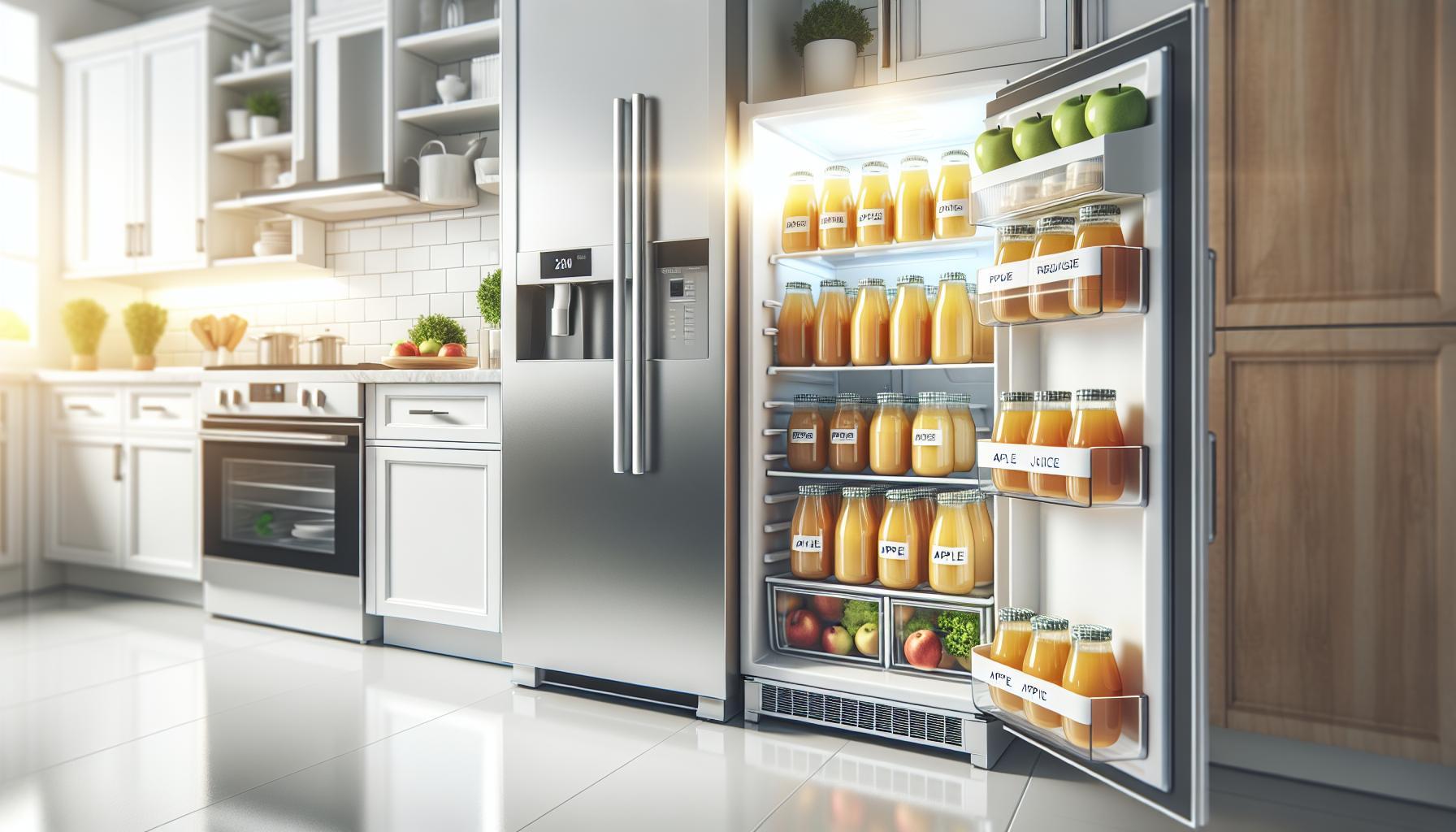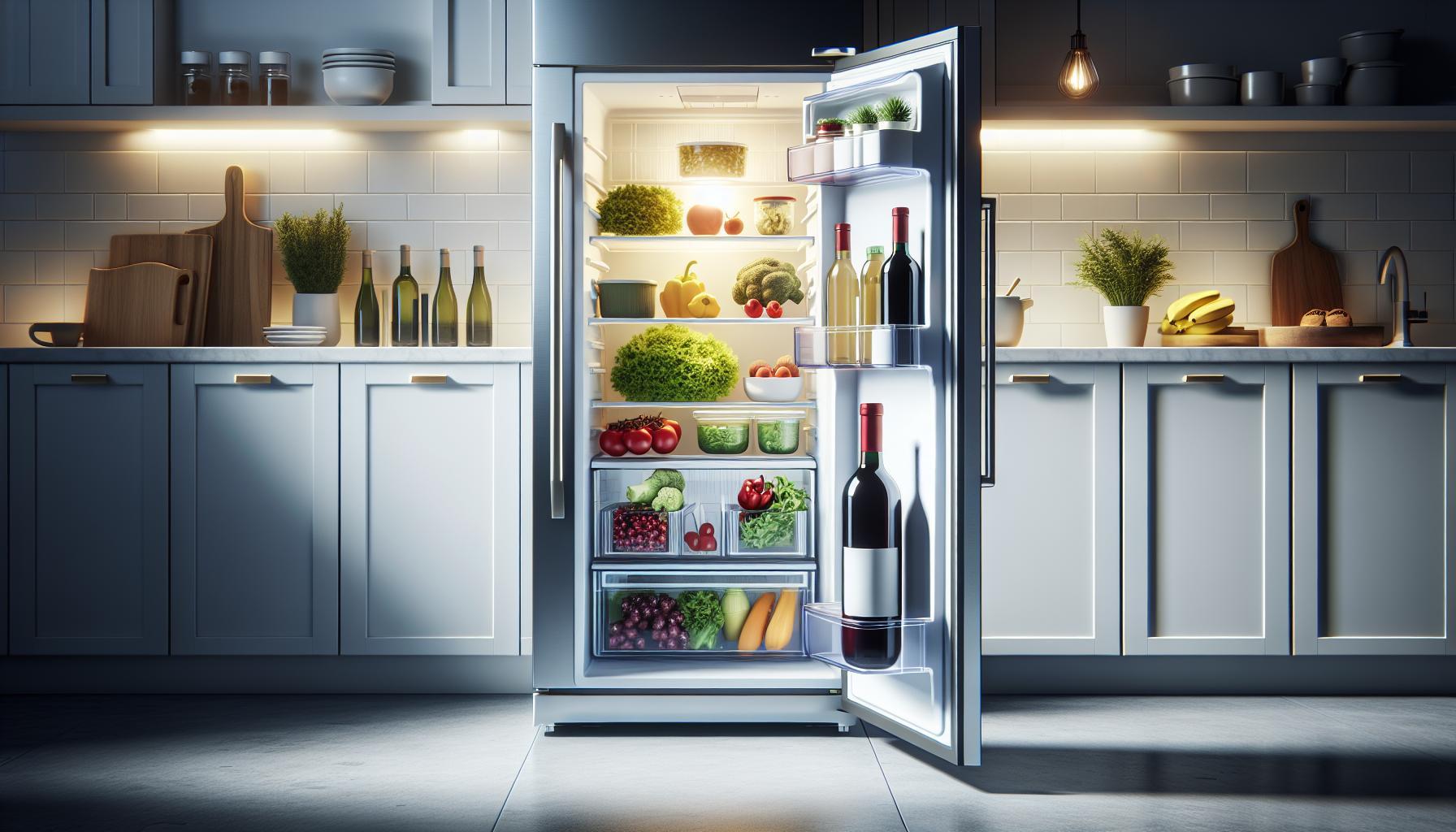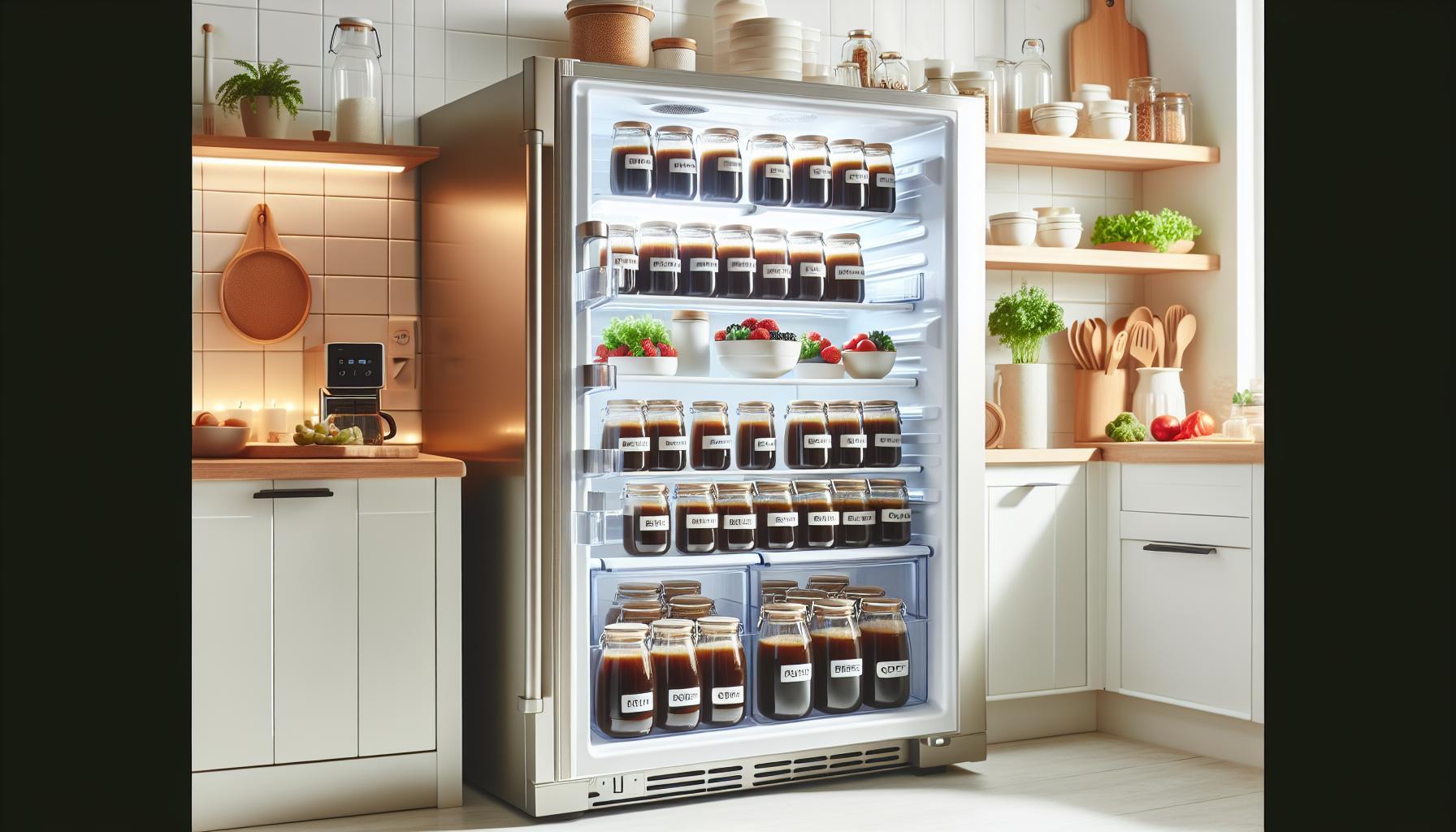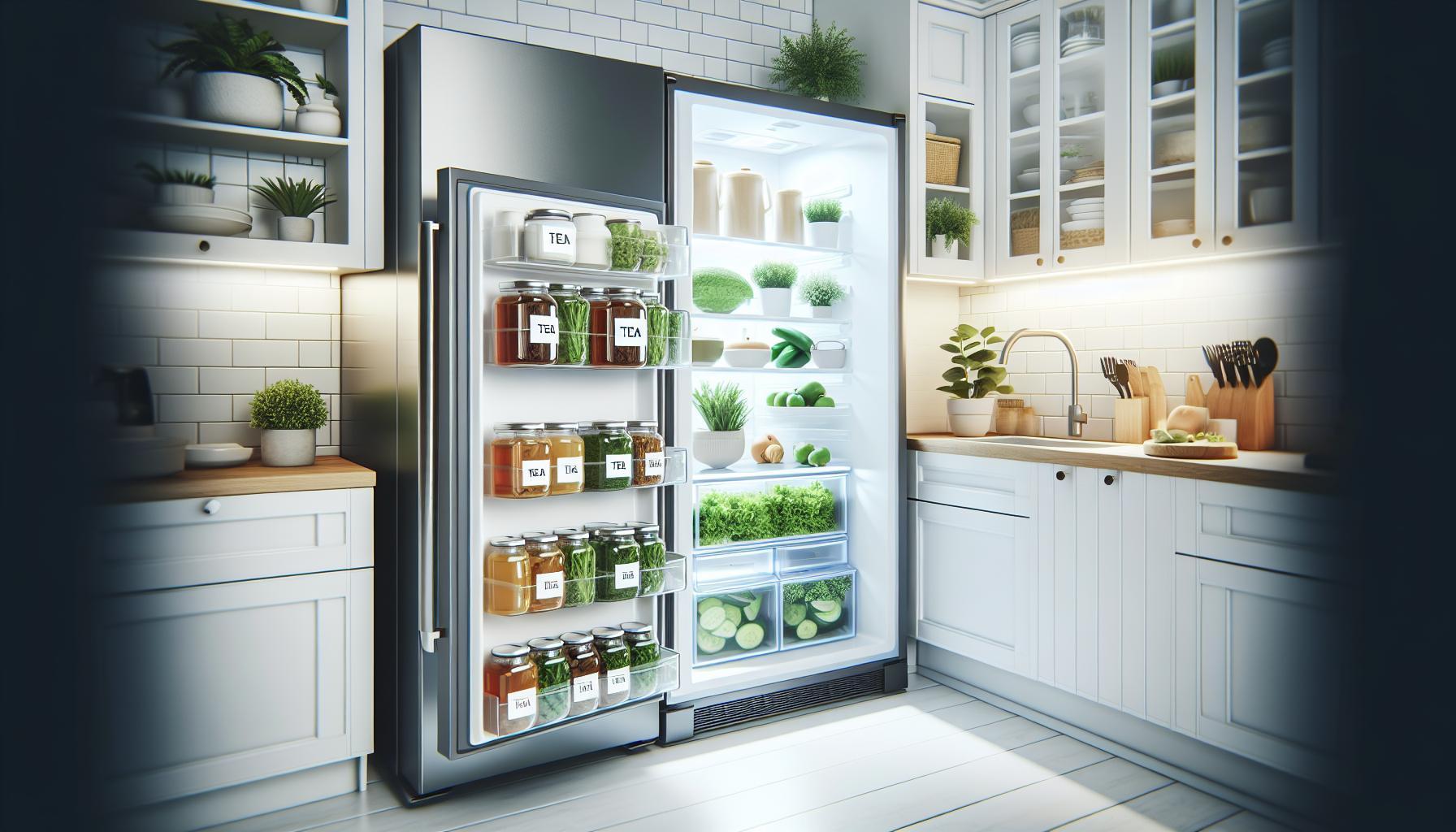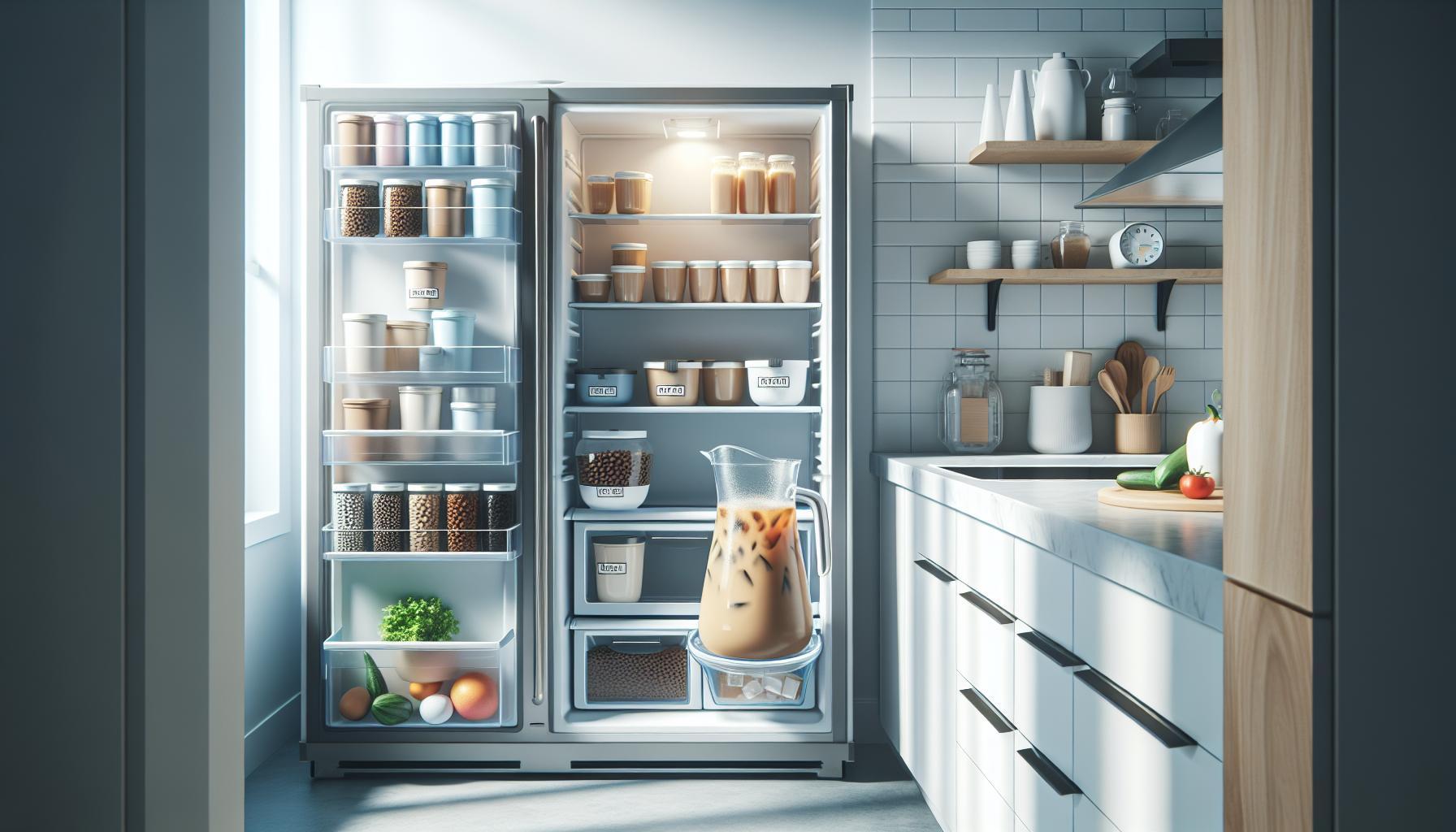Did you know that improperly stored apple juice can develop off flavors within just a few days? Understanding how long apple juice lasts in the fridge is essential to enjoying its crisp, refreshing taste. This guide will walk you through the proper storage methods, helping you maximize freshness and minimize waste.
Many of us buy apple juice in bulk, only to find ourselves staring at a bottle weeks later, unsure if it’s still safe to drink. Learning about the shelf life of apple juice, along with tips to prevent spoilage, will ensure you make the most of your purchase. So, if you’re curious about how to store your apple juice effectively and keep it tasting great, read on for expert insights and practical advice.
How Long Can You Keep Apple Juice in the Fridge?
Apple juice is not only a delicious beverage but also one that requires proper storage to maintain its freshness and flavor. When stored in the refrigerator, unopened apple juice can typically last about 1 to 3 months past its printed expiration date if kept at consistent cold temperatures. Once opened, it’s best to consume the apple juice within 7 to 10 days for optimal taste and safety. Always remember to seal the bottle or container tightly after each serving to prevent exposure to air, which can accelerate spoilage.
Temperature plays a crucial role in the longevity of apple juice. Keeping your refrigerator at or below 40°F (4°C) is essential; anything warmer can lead to a rapid decline in quality. If you’re unsure about the freshness, always trust your senses-look for signs like off odors, changes in color, or sediment. Consuming juice that has been stored properly within these time frames ensures that you enjoy it when it’s at its best.
Incorporating some simple best practices can help extend the storage life of your apple juice. For instance, always check the packaging for specific storage instructions and avoid leaving apple juice out at room temperature for extended periods. In addition, consider using clear containers made for food storage, as they not only keep the juice sealed but are also easy to inspect for any changes in quality.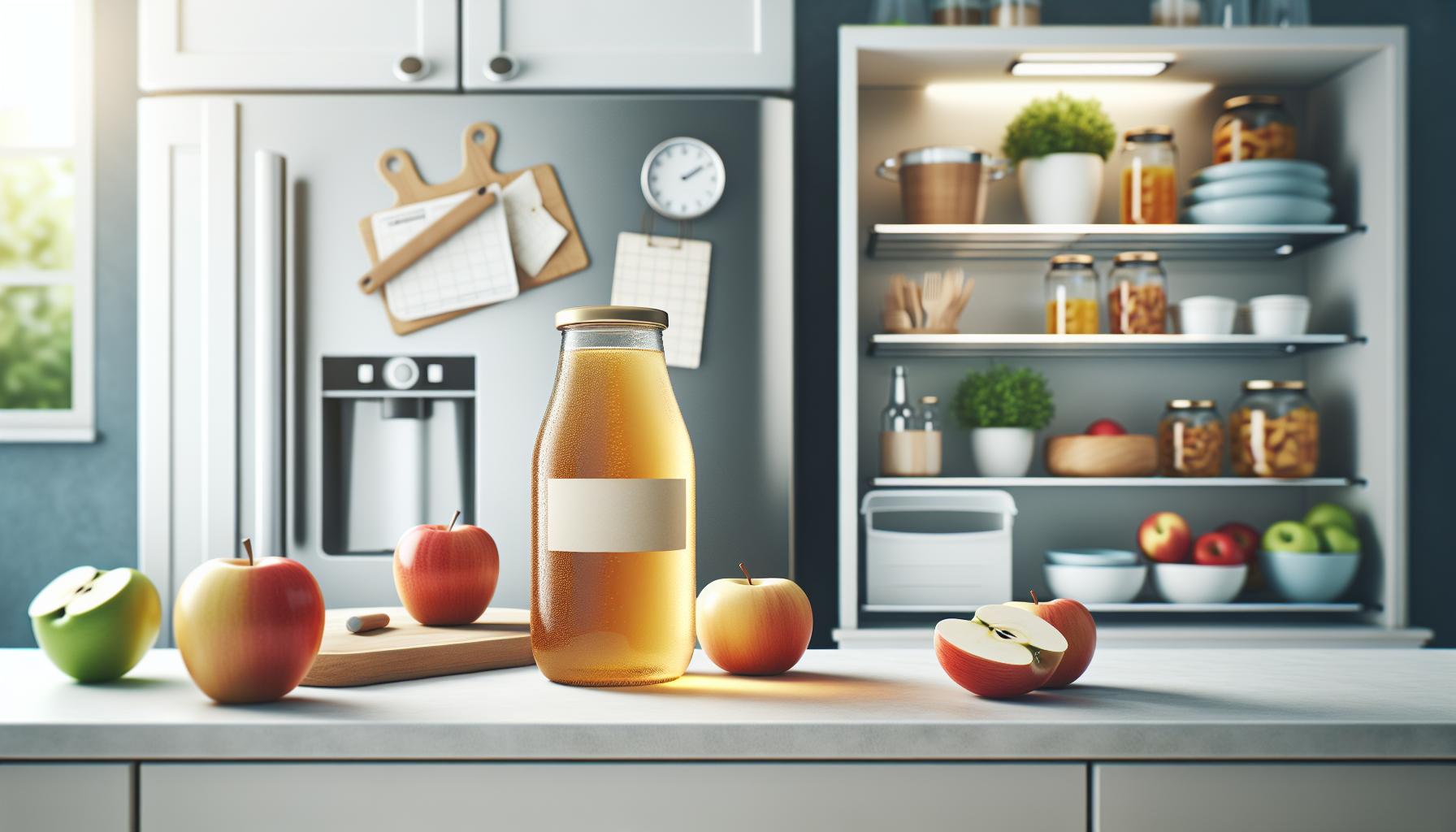
Signs Your Apple Juice Has Gone Bad
Fresh apple juice is a delightful and refreshing drink, but it can lose its quality quickly if not stored properly. Knowing how to identify when apple juice has gone bad is crucial for both safety and flavor. There are several signs to look for that indicate your apple juice may no longer be good to consume.
The first and most apparent sign is a change in odor. If the juice emits a sour or off-putting smell, it is no longer fresh. Fresh apple juice should have a sweet, pleasant aroma. Additionally, look for any changes in color. While fresh apple juice has a vibrant, light golden hue, spoilage can cause it to darken or take on an unusual tint, often signaling fermentation or bacterial growth.
Sediment is another key indicator. If you notice any particles settling at the bottom or floating in the juice, it’s a sign that the juice may have fermented or spoiled. Furthermore, a change in texture can also be a telltale sign. Fresh apple juice is smooth and liquid; if it appears unusually thick or has begun to separate, it’s a good indication something has gone wrong.
When it comes to consumption, trust your senses. If you suspect your apple juice may have spoiled due to any of the signs mentioned above, it’s best to err on the side of caution and discard it. Remember, food safety is paramount, and it’s always better to be safe than sorry when it comes to consuming potentially spoiled juice.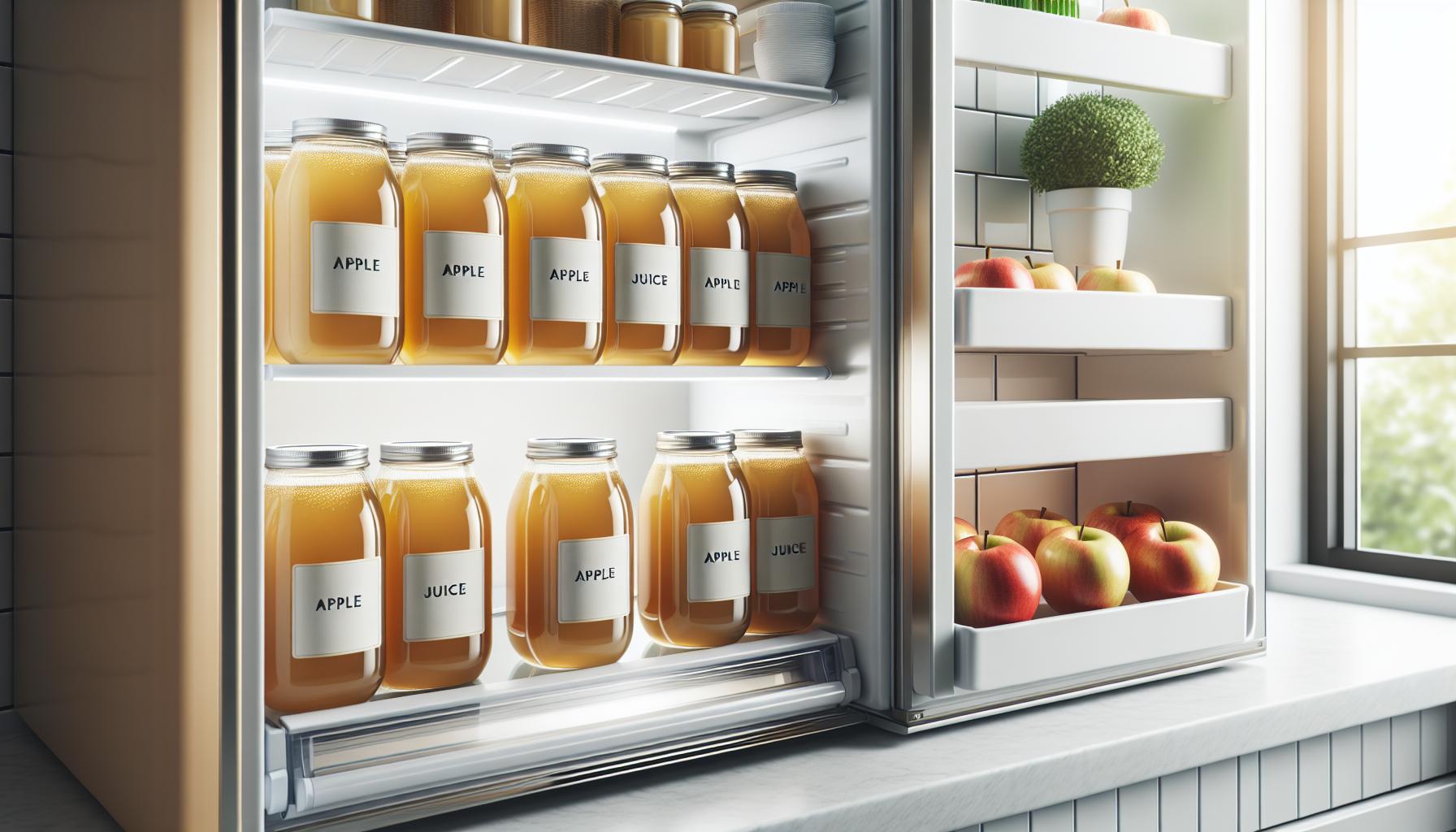
Tips for Storing Apple Juice Properly
To ensure that your apple juice stays fresh and flavorful for as long as possible, proper storage is essential. By following a few key practices, you can maximize its shelf life and prevent off flavors that may develop over time. One of the most important factors in storing apple juice is temperature. Always keep your juice refrigerated, ideally at or below 40°F (4°C). This slows down the growth of bacteria and preserves the freshness of the juice.
When it comes to packaging, store apple juice in an airtight container. If you’re using a carton or bottle, make sure it’s sealed tightly after each use to minimize exposure to air, which can lead to oxidation and spoilage. For homemade apple juice or fresh-pressed varieties, consider using glass jars, which can be better for preserving taste and quality. If you don’t have a large container, you can also divide the juice into smaller portions to reduce the amount of air in the container each time you open it for a glass.
Additional tips for effective storage include:
- Check the expiration date if you’re using store-bought juice; once opened, most apple juices are best consumed within 7 to 10 days.
- Label your homemade juice containers with the date of pressing, so you can keep track of how long it’s been stored.
- Avoid storing apple juice near strong-smelling foods in the fridge, as it can absorb odors and alter its flavor.
By adhering to these simple yet effective tips, you can enjoy your apple juice at its best and reduce the risk of spoilage or undesirable tastes. Whether you’re sipping it fresh or using it in recipes, well-stored apple juice will deliver that crisp, sweet flavor you love!
How to Extend the Shelf Life of Apple Juice
To maximize the longevity of apple juice and keep it tasting fresh, understanding how to store it correctly is vital. One crucial step is ensuring that apple juice is consistently kept refrigerated. Aim for a fridge temperature below 40°F (4°C); this colder environment slows down bacterial growth and enzymatic reactions that can spoil the juice. If you frequently open your fridge or have a less reliable temperature control, consider using a thermometer to monitor conditions more accurately.
Utilizing airtight containers is another best practice. If you’re storing an opened container, make sure it’s securely closed after each use to limit the air exposure that can lead to oxidation and off flavors. For homemade or fresh-pressed juices, glass jars are particularly effective. They not only help maintain flavor quality but also prevent potential chemical leaching that can occur with some plastics. If you have leftover juice, portioning it into smaller containers helps minimize air exposure every time you pour a glass.
Implementing the use of vacuum sealing can also significantly extend the shelf life of your juice. By removing oxygen from the storage environment, you create a barrier against both spoilage and flavor degradation. If you’re not ready to drink your juice within a week or two, consider freezing it. Be sure to leave some space in the container, as liquids expand when frozen, preventing potential breakage. Thawing should be done in the fridge, allowing for gradual defrosting that preserves flavor.
In summary, keep apple juice refrigerated at optimal temperatures, use airtight and preferably glass containers, consider vacuum sealing, and don’t hesitate to freeze if you’re not consuming your juice right away. These steps will empower you to savor every drop without worrying about spoilage.
Preventing Off Flavors in Apple Juice
Keeping apple juice fresh and free of off flavors is essential for enjoying its sweet and crisp taste. One common cause of off flavors in apple juice is oxidation, which occurs when the juice is exposed to air. To minimize this, always store your apple juice in the refrigerator immediately after use. Ensure the container is tightly sealed; using airtight glass bottles is ideal, as they do not impart any unwanted flavors unlike some plastics. If the juice is home-pressed or fresh, consuming it within a week will help preserve its quality.
Another critical factor is temperature. Apple juice should be kept at a consistent temperature below 40°F (4°C). Fluctuations in temperature can facilitate spoilage and lead to the breakdown of taste. For those who tend to leave the fridge door open frequently, it may be worth investing in a thermometer to monitor the internal conditions closely. If you’re not planning to drink the juice within a few days, consider freezing it. Just remember to leave some headspace in the container for expansion during freezing, which can help retain its original taste when thawed.
Additionally, be mindful of the storage duration. Opened apple juice typically lasts about 7 to 10 days in the refrigerator, while unopened store-bought juice can last much longer, often until the expiration date indicated on the label. Regularly check for changes in color and taste; if the juice tastes off or has developed an unusual odor, it’s best to discard it. By following these guidelines, you can enjoy your apple juice at its best, savoring its fresh and delightful flavors without the unpleasant surprise of off tastes.
Nutritional Changes Over Time in Apple Juice
As apple juice is a popular drink enjoyed by many, understanding how its nutritional value changes over time is essential for maintaining its quality and health benefits. Fresh apple juice is rich in vitamins, particularly vitamin C, and various antioxidants that contribute to overall health. However, as apple juice is exposed to light and air, its nutritional content can begin to degrade. This process, known as oxidation, leads not only to a loss of vitamins but also to changes in flavor and color.
Over the first few days after opening, apple juice retains most of its nutritional benefits. Vitamin C levels, which are crucial for immune function and skin health, may decline gradually, dropping by about 15% within the first week if stored properly in the refrigerator. After this initial period, the rate of deterioration accelerates, especially if the juice has been left open or stored improperly. Notably, exposure to light can also diminish its nutrient content, underscoring the importance of keeping juice in opaque or dark containers.
To help maintain the nutritional integrity of apple juice, it is advisable to consume it relatively quickly after opening-ideally within seven days. For longer storage, freezing apple juice can significantly slow nutrient loss, preserving most of its vitamins and antioxidants for months. When thawing, it’s best to do so in the refrigerator and to consume it within a few days for optimal taste and nutrition.
Maintaining the freshness and nutritional quality of apple juice isn’t just about storage methods-it’s also about paying attention to sensory cues. If you notice changes in taste, smell, or color, it may indicate that the juice has deteriorated past the point of safe consumption. By storing it correctly and being mindful of its changing nutritional profile, you can enjoy apple juice at its best, maximizing both flavor and health benefits.
What to Do If Apple Juice Spoils
Apple juice, like many fresh beverages, is best enjoyed when it’s at its peak quality. However, there are times when it can spoil, and knowing how to handle this situation ensures both safety and satisfaction. If you suspect that your apple juice has gone bad, the first step is to trust your senses. Check for off-putting odors, unusual textures, or visible signs of fermentation such as bubbles or cloudy appearance. Spoiled apple juice may also taste excessively sour or different from its usual flavor. If any of these signs are present, it’s essential to avoid consuming the juice.
The next course of action is to face the inevitable decision to dispose of the spoiled juice. Rather than simply throwing it in the kitchen trash, consider pouring it down the sink or toilet to prevent any potential spillage or leaks that could make a mess. Rinse the container thoroughly before recycling or discarding it to avoid any lingering smells or attracting pests. Additionally, wash your hands afterward to maintain hygiene.
For those particularly savvy with food management, consider using this moment as a learning opportunity. Write down when you opened the bottle and how long the juice lasted. This information can help you establish your own guidelines for apple juice storage moving forward. Always remember to label your containers with opening dates to keep track of their freshness.
Lastly, if apple juice spoiling is a frequent issue in your home, it may be time to assess your storage practices. Ensure that the juice is kept sealed tightly in the refrigerator and away from direct light. Whenever possible, purchase smaller containers if you find that you are consistently unable to finish a larger bottle. This way, you can enjoy fresh apple juice without the worry of it spoiling before you get a chance to enjoy it.
Best Practices for Freezing Apple Juice
When it comes to preserving apple juice for a longer period, freezing is one of the best options available. Freezing apple juice not only retains its flavor and nutritional value but also allows you to enjoy your favorite drink at a later date without worrying about spoilage. The key to successful freezing lies in the proper preparation and storage techniques.
Preparation Steps
Before placing apple juice in the freezer, ensure it is well-chilled and freshly opened. If you’re freezing juice from a large container, consider dividing it into smaller portions. This approach allows for easier thawing and prevents waste. Use freezer-safe containers or heavy-duty freezer bags for storage. When filling containers, leave at least one inch of headspace. Apple juice expands as it freezes, and the extra space helps prevent the containers from breaking.
Duration in Freezer
Frozen apple juice maintains its best quality for up to 8-12 months. While it may remain safe to consume beyond this timeframe, the flavor and nutritional value may begin to diminish. For best results, label each container with the freezing date to keep track of its freshness.
Thawing Process
When you’re ready to enjoy your frozen juice, always thaw it in the refrigerator rather than at room temperature. This method helps prevent any bacteria from developing during the thawing process. Typically, apple juice will take several hours to thaw in the fridge, so plan ahead. Once thawed, consume the juice within 3 to 5 days for optimal taste and safety.
By following these simple practices, you can enjoy apple juice that remains flavorful and safe long after its expiration date, making it a delightful addition to your culinary routine.
Comparing Shelf Life: Store-Bought vs. Homemade Apple Juice
The shelf life of apple juice can vary significantly depending on whether it’s store-bought or homemade. Understanding these differences can help you make informed decisions about consumption and storage to ensure the best flavor and safety.
Store-bought apple juice typically undergoes pasteurization, which kills harmful bacteria and extends its shelf life. An unopened container can last for about 1-2 years in the pantry and, once opened, it can last in the fridge for approximately 7-10 days. Many commercial brands also add preservatives that enhance shelf stability, though consumers should always check the label for specific guidance.
On the other hand, homemade apple juice does not benefit from the same preservation techniques. Without pasteurization, it is more prone to spoilage, especially if not consumed quickly. Homemade juice should ideally be refrigerated and consumed within 3-5 days. For those wanting to extend the shelf life of homemade juice, freezing is a viable option, allowing it to last up to 8-12 months while retaining flavor and nutrition.
By recognizing these key differences, you can better manage your apple juice supply to maximize freshness and enjoy its delicious taste without risking spoilage. Always prioritize storage conditions-keeping opened juices tightly sealed and refrigerated, regardless of the type, is essential for prolonging their shelf life.
Understanding Expiration Dates on Apple Juice
Understanding the expiration dates on apple juice is crucial for ensuring both quality and safety. Expiration dates can often be confusing, as they vary between store-bought and homemade juices. Typically, the expiration date on store-bought juice refers to the time frame in which the product maintains its best flavor and quality, not an absolute deadline for safety. Unopened commercial apple juice can last well beyond its printed date if stored properly; however, once opened, it should be consumed within 7-10 days for optimal freshness.
Homemade apple juice, lacking the preservatives and pasteurization of its commercial counterparts, has a shorter lifespan. It’s best consumed within 3-5 days of preparation when stored in the refrigerator. After this period, not only does the taste deteriorate, but there’s an increased risk of spoilage. For those who want to extend the shelf life of homemade juice, freezing is an effective option that can preserve it for 8-12 months without significant loss of flavor or nutrients.
When checking for spoilage, always be vigilant of any changes in color, smell, or taste, which may indicate that the juice has gone bad regardless of the expiration date. If you notice any off flavors or odors, it’s better to err on the side of caution and discard the juice. By understanding these expiration indicators and storage practices, you can enjoy your apple juice while minimizing waste and safeguarding your health.
Common Myths About Apple Juice Storage
Some prevalent myths surrounding apple juice storage can mislead consumers, leading to food waste or potential health risks. Understanding the facts can help in making informed decisions about enjoying apple juice while minimizing spoilage and maximizing safety.
One common misconception is that all apple juice can be stored indefinitely as long as it’s refrigerated. While refrigeration does slow down the spoilage process, it does not stop it altogether. Store-bought, unopened apple juice can last well beyond its printed expiration date if kept in a cool environment, yet once opened, it typically remains fresh for only 7-10 days. Conversely, homemade apple juice lacks preservatives and should be consumed within 3-5 days. Ignoring these time frames can result in off-flavors, loss of nutrients, and even spoilage.
Another myth is that apple juice must always be consumed fresh to avoid health risks. While fresh juice offers superior taste, it’s essential to check for signs of spoilage regardless of whether it’s fresh or pasteurized. Changes in color, an off smell, or uncharacteristic flavors are critical indicators that the juice may no longer be safe to consume. It’s important to remember that past the expiration date or after the recommended storage period, both opened store-bought and homemade juices can harbor harmful bacteria.
Additionally, many believe that freezing apple juice alters its taste and nutritional content significantly. This is untrue; when frozen properly, apple juice can retain its flavor and nutrients for 8-12 months. In fact, freezing is an excellent way to prolong the shelf life of any juice. Just ensure the juice is stored in air-tight containers to prevent freezer burn and maintain quality.
By dispelling these myths, consumers can make better choices regarding storage, safety, and enjoyment of apple juice, ensuring they savor its refreshing taste without unnecessary waste.
When to Toss Out Your Apple Juice
Knowing when to discard your apple juice is critical for ensuring both its taste and safety. All juices eventually reach a point where they are no longer suitable for consumption, and being able to identify this moment can prevent potential foodborne illnesses. Generally, if your juice has been opened, it should ideally be consumed within 7-10 days for store-bought options and 3-5 days for homemade versions. Beyond these timeframes, the risk of spoilage increases significantly.
One of the most reliable indicators that it’s time to toss out your apple juice is a noticeable change in its appearance or smell. If you notice any of the following, it’s safer to discard the juice:
- Cloudiness or sediment: Fresh apple juice is typically clear. If you see cloudiness or sediment settling at the bottom, it may indicate spoilage.
- Off odors: Juice should have a fresh, fruity scent. A sour or fermented smell signals that bacteria may have developed.
- Unusual flavors: If tasting your juice results in a bitter or unpleasant flavor, it’s best to dispose of it.
Additionally, check the expiration date or any “best by” date printed on the label if it’s store-bought. While unopened juice may last beyond this date if stored properly, any juice past the date should be treated with caution, particularly after opening.
Storing apple juice in an airtight container during refrigeration can extend its shelf life, but even with proper storage, it’s essential to remain vigilant about these signs of spoilage. When in doubt, it’s always safer to err on the side of caution-if it looks, smells, or tastes off, it’s time for it to go. Proper food safety practices not only enhance your enjoyment of apple juice but also ensure your health and well-being.
FAQ
Q: How should I store apple juice to maximize its freshness?
A: To maximize freshness, store apple juice in an airtight container in the refrigerator. Ensure it’s kept away from light and heat sources, as these can degrade the flavor. For extended storage, consider freezing apple juice in small portions, which can be convenient for later use.
Q: Can apple juice go bad if left unopened in the fridge?
A: Yes, while unopened apple juice can last longer than opened juice, it can still go bad. Generally, store-bought apple juice is safe for about 7 to 10 days past its expiration date if constantly refrigerated. Always check for signs of spoilage, such as changes in color, odor, or taste.
Q: What causes off flavors in apple juice?
A: Off flavors in apple juice can be caused by oxidation, prolonged exposure to air, or contamination from improper storage. To prevent this, make sure to seal containers tightly and consume the juice within a week of opening, keeping it in the coldest part of the fridge.
Q: Is it safe to drink apple juice after the expiration date?
A: While apple juice may still be safe to drink shortly after its expiration date if stored properly, it’s best to check for signs of spoilage. Any unusual smell, flavor, or appearance indicates that it should be discarded.
Q: How can I tell if my homemade apple juice has gone bad?
A: Homemade apple juice can go bad if it develops a sour smell, off taste, or any visible mold. If you notice any of these signs, it’s best to err on the side of caution and discard it. Always store homemade juice in the refrigerator and consume it within a few days.
Q: What can I do with leftover apple juice that I can’t finish?
A: For leftover apple juice, consider freezing it in ice cube trays for future use in smoothies or recipes. Alternatively, use it in cooking or baking, where it can add flavor to sauces, marinades, or baked goods.
Q: Can I mix apple juice with other juices for better preservation?
A: Mixing apple juice with other juices can alter taste but may not significantly impact preservation. Ensure all juices are fresh and properly stored, as the flavor and shelf life will depend on the least stable ingredient in the mix.
Q: Why does apple juice sometimes taste different after refrigeration?
A: Apple juice may taste different after refrigeration due to natural oxidation and the settling of solids. To refresh the flavor, give it a good shake before consuming. If the taste remains unusual, it may indicate spoilage.
In Retrospect
Now that you know how long apple juice lasts in the fridge and how to prevent off flavors, it’s time to put that knowledge to use! Remember, proper storage is key: always keep your juice sealed tightly and check for any changes in smell or taste before consuming.
For more tips on maximizing the freshness of your favorite drinks, explore our articles on “How to Store Fresh Juices” and “Best Practices for Food Safety.” Plus, don’t forget to sign up for our newsletter for exclusive content and food storage hacks delivered right to your inbox!
If you have any questions or want to share your own apple juice experiences, drop a comment below! We’d love to hear from you. Ensuring your beverages taste their best is just the beginning-discover more ways to make informed choices about your food and drink with us!

